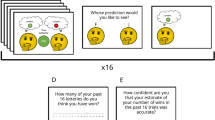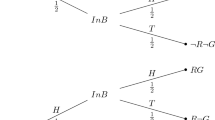Abstract
An experiment is reported which tests for positive confirmation bias in a setting in which individuals choose what information to buy, prior to making a decision. The design – an adaptation of Wason's selection task – reveals the use that subjects make of information after buying it. Strong evidence of positive confirmation bias, in both information acquisition and information use, is found; and this bias is found to be robust to experience. It is suggested that the bias results from a pattern of reasoning which, although producing sub-optimal decisions, is internally coherent and which is self-reinforcing.
Similar content being viewed by others
REFERENCES
Becker, G.M., DeGroot, M.H. and Marschak, J. (1963), Stochastic models of behavior, Behavioral Science 8: 41-55.
Börgers, T. (1996), On the relevance of learning and evolution to economic theory, Economic Journal 106: 1374-1385.
Börgers, T. and Sarin, R. (1997), Learning through reinforcement and replicator dynamics, Journal of Economic Theory 77: 1-14.
Cheng, P.W. and Holyoak, K.J. (1985), Pragmatic reasoning schemas, Cognitive Psychology 17: 391-416.
Cheng, P.W. and Holyoak, K.J. (1989), On the natural selection of reasoning theories, Cognition 33: 285-313.
Cosmides, L. (1989), The logic of social exchange: has natural selection shaped how humans reason? Studies with theWason selection task, Cognition 31: 187-276.
Cubitt, R.P. and Sugden, R. (1998), The selection of preferences through imitation, Review of Economic Studies 65: 761-771.
Evans, J.St.B.T. (1972), Interpretation and ‘matching bias’ in a reasoning task, Quarterly Journal of Experimental Psychology 24: 193-199.
Evans, J.St.B.T. and Lynch, J.S. (1973), Matching bias in the selection task, British Journal of Psychology 64: 391-397.
Fischoff, B. and Beyth-Marom, R. (1983), Hypothesis evaluation from a Bayesian perspective, Psychological Review 90: 239-260.
Gick, M.L. and Holyoak, K.J. (1980), Analogical problem solving, Cognitive Psychology 12: 306-355.
Griggs, R.A. and Cox, J.R. (1982), The elusive thematic-materials effect in Wason's selection task, British Journal of Psychology 73: 407-420.
Hey, J.D. and Orme, C. (1994), Investigating generalizations of expected utility theory using experimental data, Econometrica 62: 1291-1326.
Johnson-Laird, P.N., Legrenzi, P. and Legrenzi, M.S. (1972), Reasoning and a sense of reality, British Journal of Psychology 63: 395-400.
Klayman, J. (1995), Varieties of confirmation bias, in J. Busemeyer, R. Hastie and D.L. Medin (eds), Decision Making from a Cognitive Perspective. Psychology of Learning and Motivation 32: 365-418.
Klayman, J. and Ha, Y.-W. (1987). Confirmation, disconfirmation, and information in hypothesis testing, Psychological Review 94: 211-228.
Loomes, G. and Sugden, R. (1995), Incorporating a stochastic element into decision theories, European Economic Review 39: 641-648.
Manktelow, K.I. and Evans, J.St.B.T. (1979), Facilitation of reasoning by realism: effect or non-effect? British Journal of Psychology 70: 477-488.
Manktelow, K.I and Over, D.E. (1993), Rationality, utility and deontic reasoning, in K.I. Manktelow and D.E. Over (eds.), Rationality: Psychological and Philosophical Perspectives. London: Routledge.
Oaksford, M. and Chater, N. (1994), A rational analysis of the selection task as optimal data selection, Psychological Review 101: 608-631.
Reich, S.S. and Ruth, P. (1982), Wason's selection task: verification, falsification and matching, British Journal of Psychology 73: 395-405.
Roth, A. and Erev, I. (1995), Learning in extensive-form games: experimental data and simple dynamic models in the intermediate term, Games and Economic Behavior 8: 164-212.
Selten, R., Sadrieh, A. and Abbink, K. (1999), Money does not induce risk neutral behavior, but binary lotteries do even worse, Theory and Decision 46: 211-249.
Wason, P.C. (1968), Reasoning about a rule, Quarterly Journal of Experimental Psychology 20: 273-281
Wason, P.C. and Johnson-Laird, P.N. (1972), The Psychology of Reasoning: Structure and Content. Cambridge, Mass.: Harvard University Press.
Author information
Authors and Affiliations
Rights and permissions
About this article
Cite this article
Jones, M., Sugden, R. Positive confirmation bias in the acquisition of information. Theory and Decision 50, 59–99 (2001). https://doi.org/10.1023/A:1005296023424
Issue Date:
DOI: https://doi.org/10.1023/A:1005296023424




